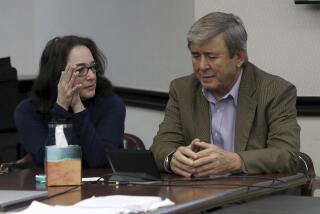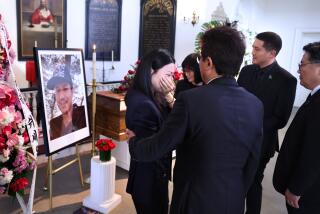Jury Finds That Teen Was Sane During Killings
A Superior Court jury ruled Tuesday that a 14-year-old boy from Upland was sane when he fatally shot his mother and younger sister more than two years ago.
The decision means that Paul Yum, now 17, faces 80 years to life in state prison when he is sentenced in February.
“His mother’s family has been here throughout this trial,” defense attorney Angela Oh told jurors outside court. “They want him to have a life and a future, and now he’s not going to have one. He’s not going to have a life outside of prison.”
The same jury in Rancho Cucamonga found Yum guilty Dec. 7 of second-degree murder in the deaths of Ester Yum, 39, and Christine Yum, 9.
Jurors deliberated for about 16 hours before reaching their conclusion in the trial’s sanity phase.
Defense attorneys argued that Yum suffered from post-traumatic stress disorder because of his father’s abuse and was in a “dissociative state” during the killings.
Yum shot his mother and sister in the head with a single-shot, high-velocity, bolt-action deer rifle on June 11, 1999, then picked up the shell casings, took thousands in cash and fled to Las Vegas, stopping along the way to throw the gun by the side of the road.
Friends testified he had talked about killing his parents earlier in the week.
“Too many of his actions were inconsistent with him being insane,” jury foreman Tim Martin said.
Martin, a 39-year-old bank examiner from Rancho Cucamonga, said the first jury poll showed eight jurors believing Yum to be sane and four leaning to insanity.
One of the latter said she had trouble figuring out why Yum would kill his sister if he was angry at his father.
“It just made no sense,” she said. The juror, who declined to give her name, said she believed the testimony of Dr. Nancy Kaser-Boyd, a defense expert who testified that Yum was experiencing again a previous beating when his mother yelled at him, causing him to fear for his life and focus on his own survival.
“I could see all the emotions that welled up,” the juror said. “I think with these issues, you have no control over that.”
The juror said that ultimately, the evidence was about even for her, and the burden of proof was on the defense.
“My vote was on the law,” she said. “I had to remove my emotion.”
Schoolmates told police that Yum considered his little sister a brat, who always got him in trouble. He had a younger brother, who lay asleep in another room and was not harmed.
Yum told psychologists he was closer to his brother, which made it seem that he was capable of sane decisions, said juror Francis Motheral, a retiree who lives in Upland and was the foreman during the guilt phase of the trial.
Deputy Dist. Atty. Nancy Cooper said she was pleased with the verdict.
“I think the jury made the right decision,” she said.
Cooper said she felt gratified to have gotten justice for Ester and Christine Yum. She said she was not convinced by Paul Yum’s claim to have been an abused child.
“I think the parents probably could have handled it better if what he’s saying is true,” she said. “But I don’t think they pressured him any more than normal.”
Jurors heard evidence that Yum suffered from attention deficit disorder, and could not meet his parents’ high expectations. Kaser-Boyd testified that Yum was badly beaten after being expelled from a private preparatory school and feared that he could not survive another beating.
“We were extremely sympathetic,” Motheral said. “And we are hopeful that the young man can get some kind of treatment.”
Several jurors wanted to put Yum’s father on trial.
“In my heart, we had the wrong guy. We should have had his father,” said Jim Walton, 56, of Rancho Cucamonga, who works for the Navy.
Tai Yum is believed to be in Korea and has not been heard from for more than six months, Oh said.
Had the jury found Yum insane, Oh said, it would have been the first successful post-traumatic stress disorder defense for a defendant so young at the time of the crime.
Yum had little reaction when the court clerk read the verdicts. He spoke briefly with his attorneys before being taken away. “He mostly said thank you, which was most painful for me,” defense attorney Michael Yamamoto said.
Martin, the foreman, said jurors tried to scan Yum for emotion during the trial but found none. Yum did not testify.
More to Read
Sign up for Essential California
The most important California stories and recommendations in your inbox every morning.
You may occasionally receive promotional content from the Los Angeles Times.










